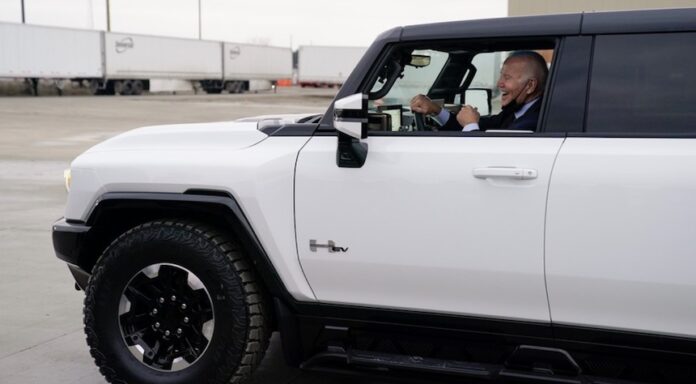According to experts, 67% of new car sales will be e-vehicles by 2032 under the new vehicle emission rules proposed by EPA. According to the Washington Post, the new rules will have “the most severe emissions restrictions on America’s auto industry history.” Automakers would be required to reduce their emissions for pickups and passenger cars by more than half compared with the 2026 emission standards.
The cost of a gasoline-powered car will go up thousands of dollars if we can reduce our emissions so dramatically. Biden is requesting exactly this. In many ways, electric vehicles can’t compete with gasoline-powered cars, in particular in price. Even with huge subsidies, an average electric car is $18,000 more costly than a gasoline car and more expensive to run.
Electric vehicles will not be as efficient as gasoline-powered cars for at least a decade. If Biden can raise the price of gasoline-powered cars enough, Americans will have fewer options and EVs will be more appealing.
The Post said that President Biden, a self-described car guy and car enthusiast, is seizing the moment. “His Investing In America agenda is increasing domestic manufacturing and accelerating the adoption of zero-emission vehicles, such as battery electric, plug-in hybrid electric, and fuel cell electric.
Biden seemed like a “train guy” to me.
Myron Ebell is the director of Competitive Enterprise Institute’s Center for Energy and Environment. He stated that the Biden administration “is trying to bend every federal law they can find in order to force people to buy EVs.” “While there is still a market for vehicles that drivers want to purchase, government coercion is quickly limiting their choices.”
Ebell stated, “If Biden’s policies succeed, then we will soon be able to choose between purchasing an EV or not being able to afford one.”
According to Kelley Blue Book, an EV costs $64,338 on average, while a small gas-powered car costs $26,101 on average. The Department of Energy also reported that the average range of 2021 gasoline cars was 403 miles, compared with the 234-mile range of 2021 EVs.
After the rule was reported by news outlets, Republican lawmakers also condemned it.
Rep. Dan Newhouse (R-Wash.) stated, “Yet more draconian rule by the Biden Admin.” Their anti-American energy policies have put the nation on a dangerous track, from gas stoves and vehicles. It is time for the government not to regulate our lives and preserve our energy independence.
Biden’s radical EPA is trying to regulate your car’s engine into OBLIVION.
Enough energy fantasies. @HouseGOP MUST use the power of the purse to END the weaponization of the federal bureaucracy.
Slashing EPA’s funding should be at the top of the list.https://t.co/oBVo6Ce56N
— Rep. Chip Roy Press Office (@RepChipRoy) April 10, 2023
Biden’s plan has been hampered by the fact that electric charging stations are not as common as gas stations. There are 168,000 gas stations across the United States and 164,000 miles on the national highway system. The gasoline engine was at the heart of all highway construction.
What number of charging stations will you need?
Popular Science:
The Biden administration is enhancing America’s electric vehicle charging station infrastructure. Recently, the Department of Transportation approved plans to build charging stations across all 50 states. This is part of bipartisan infrastructure legislation that was passed late last year. These charging stations will be able to charge approximately 75,000 miles of highways, which is close to half of the total highway network. It is hoped that there will be 500,000 more charging stations by 2030.
However, financing the transition to cleaner transportation systems across the country is still a major challenge. It will be critical to coordinate other transportation modes and determine where the stations will be located.
It is also questionable whether the power grid will be able to cope with the additional load. This radical change will not be accepted by the American people. A Gallup Poll found that only 4% of Americans have electric cars and that only 12% are seriously considering buying one. While 43% would not purchase an electric vehicle, 41 percent said they wouldn’t, and 43% said they might.
The majority of Americans aren’t convinced that EVs can help combat climate change.
However, Americans are not all convinced that electric cars can help address climate change. Approximately four out of 10 Americans believe that electric vehicles help to address climate change.
Climate change, if it is as critical a problem as many greens believe, would make all this irrelevant — it’s too late and all of us are going to die. If this is the case, I’ll give you back your V-8 and throw away my catalytic converter. Then, go ahead, drill, baby!


